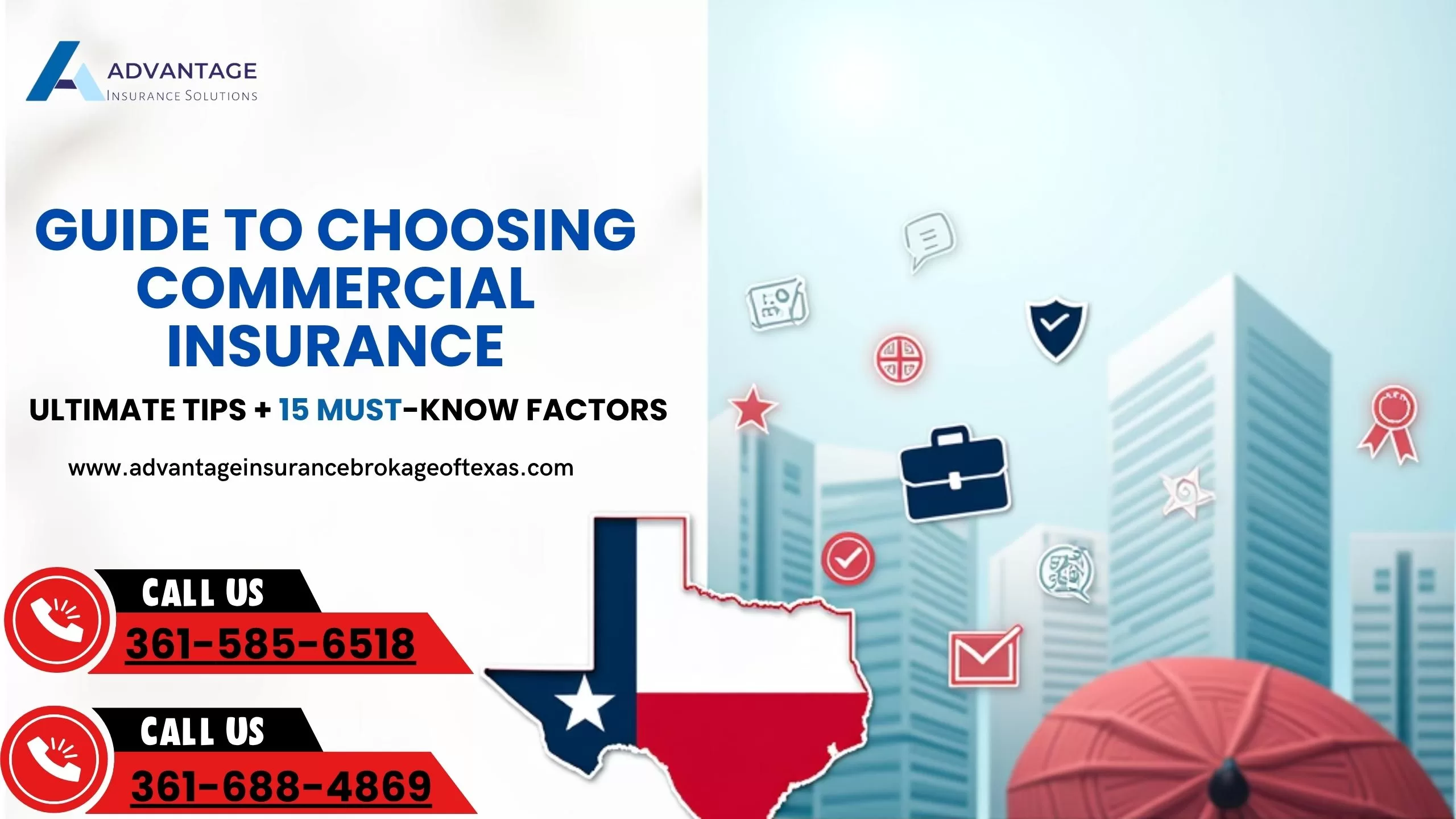
Guide to Choosing the Right Commercial Insurance in Texas – Ultimate Tips + 15 Must-Know Factors
What is Commercial Insurance in Texas?
Texas commercial insurance protects businesses from potential losses due to unforeseen events. It includes coverage for property damage, liability claims, legal fees, employee-related risks, and more. Whether you run a small shop in Corpus Christi or a multi-location operation across Texas, business insurance isn’t optional—it’s a foundational safety net. we will help you compare business insurance quotes texas.
Quick Breakdown:
| Coverage Type | What It Protects |
|---|---|
| Property | Building, contents, equipment |
| Liability | Third-party injuries, lawsuits |
| Workers’ Comp | Employee injuries or illnesses |
| Auto | Company-owned vehicles |
| Business Interruption | Lost income due to disruptions |
Why Businesses in Texas Need Commercial Insurance
Texas is pro-business, but it’s also high-risk in some areas—think hurricanes, flooding, and legal liabilities.
Here’s why commercial insurance matters in Texas:
-
Natural disasters are frequent—property coverage is essential
-
Legal costs can cripple a small business without liability protection
-
Employee claims (e.g., injury) are rising, especially in manual labor industries
-
Texas law requires certain types of coverage like workers’ comp for contractors
Bottom line: commercial insurance in Texas isn’t just smart—it’s survival.
Types of Commercial Insurance Policies
Choosing the right mix of policies is key.
Start with the basics and build based on your industry, location, and risks.
Insurance General Liability
Protects against third-party injury and property damage.
Required for most leases and contracts in Texas.
Example: A customer slips in your store and sues. This policy covers legal fees and damages.
Commercial Property Insurance
Commercial property insurance Texas Covers damage to buildings, equipment, signage, and inventory.Vital if you own physical property.
Note: Add flood coverage if you’re in a high-risk area like Houston or Galveston.
Workers’ Compensation Insurance
Pays for employee injuries and lost wages.
Not mandatory for private employers in Texas—but highly recommended and often required by contractors.
Commercial Auto Insurance
Workers compensation insurance commercial auto covers vehicles used for business (deliveries, transport, etc.). Texas law mandates liability insurance for all business-use vehicles.
Professional Liability Insurance
Also called Errors & Omissions insurance.
Protects service-based businesses from claims of negligence or failure to deliver.
Visit the Texas Department of Insurance to explore commercial insurance regulations, provider lists, and state compliance requirements.
Key Texas-Specific Regulations to Know
-
Workers’ Comp: General liability insurance workers compensation is not required by law, but if you opt out, you’re open to lawsuits.
-
Flood Coverage: Not included in most standard policies—purchase separately through NFIP or private carriers.
-
Contractual Insurance Requirements: State and city contracts often require specific minimums.
Always verify with a licensed Texas insurance agent to stay compliant.
How to Assess Your Business Insurance Needs
Every business is different.
Use these criteria to build your ideal policy package.
Industry-Based Risk Factors
-
Construction = high injury risk → Workers’ Comp, Liability
-
Restaurants = food/service risks → Property, General Liability
-
IT or consulting = advice-based risk → Professional Liability
Business Size and Assets
-
More employees = higher Workers’ Comp needs
-
High-value assets = more robust Property coverage
Number of Employees
-
1-4 employees? Get general liability + limited workers’ comp
-
10+ employees? Add EPLI (Employment Practices Liability Insurance)
What to Look for in a Commercial Insurance in Texas Provider
Don’t just chase low rates—focus on these:
-
Licensed in Texas
-
Customizable policy packages
-
Good claims reputation
-
Financially stable (A-rated or better)
-
24/7 Support or local agent
Tip: Ask for references from similar businesses in your industry for a texas business insurance guide.
How to Compare Compare Business Insurance Quotes Texas
Don’t go with the first quote. Here’s what to do:
-
Request at least 3 quotes
-
Compare by coverage, not just price
-
Check deductible amounts
-
Review exclusions
-
Evaluate customer service reviews
Use comparison tools or speak to a broker for side-by-side advice to find the best commercial insurance policies in Texas.
Common Mistakes to Avoid When Buying Business Insurance
-
Underinsuring property or income
-
Ignoring legal minimums
-
Not reading exclusions
-
Missing out on bundled savings
-
Not reviewing annually
A mistake in coverage can cost you thousands—or worse, your business.
Saving Money on Commercial Insurance in Texas Without Cutting Corners
With this Texas Insurance guide you don’t have to overpay.
Try these:
-
Bundle multiple policies for a Business Owner’s Policy (BOP)
-
Raise your deductible for lower premiums
-
Invest in risk management training to reduce liability claims
-
Install alarms, sprinklers, and cameras (often gets discounts)
-
Work with a local broker who understands Texas-specific risks
Real Texas Case Studies: Insurance in Action
Case 1: Hurricane Damage in Houston
A small logistics company with flood coverage recovered $150K in losses after Hurricane Harvey.
Case 2: Injury Lawsuit in Austin
A restaurant avoided $90K in legal fees due to a general liability policy when a customer slipped on wet floors.
Case 3: Cyber Breach in Dallas
An IT consultant’s professional liability and cyber policy covered $50K in damages after a client’s data leak.
FAQs
1. Is commercial insurance in Texas required?
Only some types like commercial auto are mandatory. Others are strongly recommended but optional.
2. What’s the average cost of commercial insurance in Texas?
Small businesses typically pay between $1,200 and $4,000 annually, depending on coverage and industry.
3. Can I bundle policies to save money?
Yes. Most insurers offer a Business Owner’s Policy (BOP) for cost-effective bundling.
4. How often should I review my policy?
At least once a year or when your business changes (new location, more employees, new services).
5. Is flood insurance included in property policies?
No. You must purchase it separately through NFIP or private insurers.
6. Where can I get help comparing commercial insurance in Texas?
Start with a licensed broker or visit Texas Department of Insurance for resources.
Tip: Before purchasing any policy, check with the Texas Department of Insurance – Commercial Coverage to understand the latest state regulations, required coverages, and to verify licensed providers.
Final Thoughts: Invest in Your Business’s Safety Net
Business in Texas moves fast—but risks move faster.
Getting the right commercial insurance in Texas gives you confidence, stability, and a backup plan for the unknown.
Don’t settle for cookie-cutter policies.
Take the time, ask questions, and protect your livelihood.

Marcus Alvarez
Author
Marcus Alvarez is the dedicated blog writer at Advantage Insurance Solutions, delivering expert insights on insurance trends, tips, and coverage options across Texas.

0 Comments